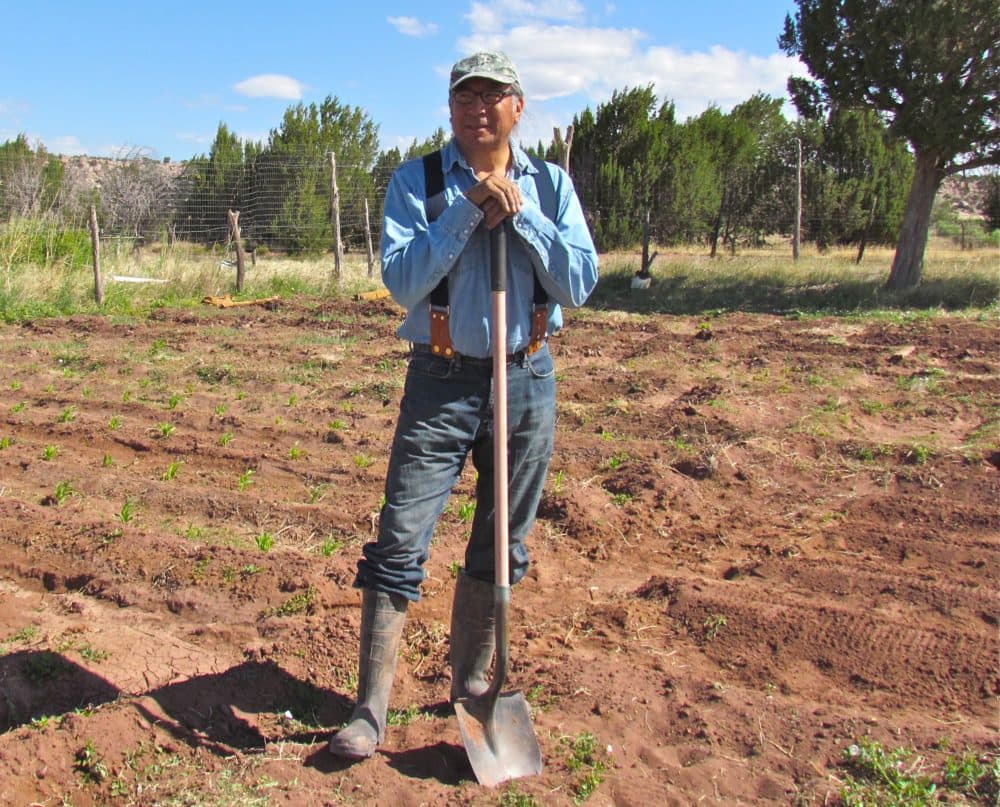Advertisement
Lessons Passed Down From Great-Grandparents Help Zuni Farmer 'Cope' In Times of Uncertainty

While most Americans are riding out the pandemic at home in a city, Zuni tribal member Jim Enote is on his farm in Western New Mexico.
The large mesas and deep-red sandstone canyons give the idea of "social distancing" new meaning. And it's where generations of Enote's family have tended to the land.
"When I was still in a cradleboard, my grandparents put seeds in my hand and held me over a hole at our family's field, and I dropped seeds into that hole," Enote says. "And so it's since been then that I have planted every year."
For 63 consecutive years, Enote has planted corn, chilies and onions.
"I think that being in a rural place is a blessing," says Enote, who is also CEO of the Colorado Plateau Foundation. "It also can be a curse, however, because adequate health care is quite some distance away."
Limited access to hospitals is just one reason Native Americans are at greater risk from the coronavirus pandemic. According to the Centers for Disease Control and Prevention, the death rate for native people in the U.S. was four times greater than other groups during the 2009 H1N1 flu pandemic.
The CDC also says native people are more vulnerable to COVID-19 because they have higher rates of preexisting conditions such as diabetes and heart disease. New Mexico Gov. Michelle Lujan Grisham told CNN this weekend that a quarter of the state's COVID-19 cases are Native American.
And the outbreak is growing on the nearby Navajo Nation, where running water makes the simple act of washing your hands difficult.
To find calm during this time of uncertainty, Enote has been looking back on other lessons about the natural world he learned from his great-grandparents, who survived measles and smallpox outbreaks, and the flu pandemic of 1918.
"I learned a lot from them," he says. "They grew up in a deep way where they were unencumbered with the kind of knowledges that we have now. And so there's things that they learned as being deep Zuni that they passed on to me."
Advertisement
Enote explained further in a recent post on social media:
In my most difficult times, my great-grandparents told me this:
All things come from a seed. Corn, redwood trees, whales, birds, fish, humans, and ideas come from seeds. All creatures breathe in and breathe out an unseen and vital force. Those creatures live all around us. They are below us, above us, and in all the waters of the world. Many of those creatures have protuberances, wings, fins, arms, and legs that help them move from one place to another.
Like us, some creatures have eyes and ears to perceive things around them.
Like us, those creatures respond when the sun rises, and when winter becomes spring.
And like us, those creatures have power beyond their physical bodies. If we think of them, that is their power speaking to us.
All things vibrate and move.
The ground sometimes shakes, and stars move across the sky. The earth and space above are the backbone of our world, and it, too, has power. We respect the power, we talk to it, and with collective ritual, we help to maintain a cosmological process."
I said, yes, it is all true.
In times of great difficulty and worry, remember this truth, we are never alone. All the creatures of the universe are not much different than us. We are all a family of beings. If we settle our nerves and enter the right frame of mind, we will conjure their powers, and nothing can undo us.
Peter O'Dowd produced and edited this piece for broadcast with Eileen Bolinsky. O'Dowd also adapted it for the web.
This segment aired on April 13, 2020.
